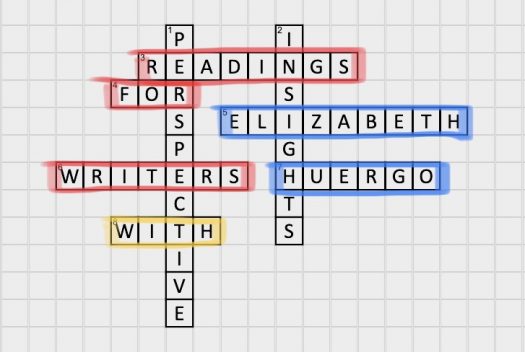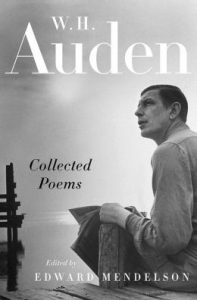Readings for Writers: Auden’s Mandate
By Elizabeth Huergo | April 28, 2020 |
 When the Apocalypse comes, I will have a dirty bum, for the righteous will have bought every last square of toilet-paper. Standing in my third grocery store of the day, the thought makes me laugh, makes me release any assumption of what I should or should not expect to find on a store shelf, makes me remember the shelves in Havana the last time I was there, and the hard-scrabble life most people here, in this country, can’t quite imagine, much less associate with the US embargo.
When the Apocalypse comes, I will have a dirty bum, for the righteous will have bought every last square of toilet-paper. Standing in my third grocery store of the day, the thought makes me laugh, makes me release any assumption of what I should or should not expect to find on a store shelf, makes me remember the shelves in Havana the last time I was there, and the hard-scrabble life most people here, in this country, can’t quite imagine, much less associate with the US embargo.
If you ask me to pick between a skirmish with cabin fever or mortal combat with this novel virus, I will choose the former every time and tell you how, by staying home, washing my hands methodically, wearing a mask, and practicing social distancing, I am helping those struggling on the front lines of this pandemic. My contribution is meager. As a writer and a teacher, I have the privilege of being able to work from home, as well as easy access to the requisite technologies.
In stark contrast, there are the caregivers doing the hard work of tending to the sick and the dying; and those who directly support them and make their work possible. We refer to people on the front lines as “essential workers” because they are necessary to our survival–though we deem unnecessary the idea of paying them well. As for the undocumented, the men, women, and children who ensure we have food to put on the table, we choose not to see them: they don’t count, and we don’t count them.
 Contagion strips us of habit. What was hidden is revealed, and it becomes impossible to look away. The moment demands our attention as writers. “All I have is a voice / To undo the folded lie,” Auden confesses in “September 1, 1939,” a poem that memorializes the Nazi invasion of Poland. As a poet, Auden wields one weapon against two types of lies: the “romantic lie” and “the lie of Authority.” He sets the sensual, momentary distractions of the common man against the avaricious will to power of the very wealthy.
Contagion strips us of habit. What was hidden is revealed, and it becomes impossible to look away. The moment demands our attention as writers. “All I have is a voice / To undo the folded lie,” Auden confesses in “September 1, 1939,” a poem that memorializes the Nazi invasion of Poland. As a poet, Auden wields one weapon against two types of lies: the “romantic lie” and “the lie of Authority.” He sets the sensual, momentary distractions of the common man against the avaricious will to power of the very wealthy.
Both lies distort our relationship to the world, leading us to delude ourselves, to believe that somehow we are separate, better, different, more important than others; that freedom is the ability to do as we please, whenever we please, and without consideration for others. Auden directly refutes those distortions:
There is no such thing as the State
And no one exists alone;
Hunger allows no choice
To the citizen or the police;
We must love one another or die.
Auden struggled with the last line of that penultimate stanza. He went back and forth between “and” and “or.” If we must love and die, then love is a purely ethical imperative. If we must love or die, then love carries with it the promise of spiritual salvation. Either way, we are inter-connected. What one of us does affects others–for better and worse, for better or worse.
In the final stanza, the poet describes a world that “in stupor lies.” The only relief from the inertia are the “ironic points of light,” visible whenever “the Just” speak. Confronted with the approaching darkness of the Second World War, Auden aligns himself with light, insisting that he,
…composed like [the Just]
Of Eros and of dust,
Beleaguered by the same
Negation and despair,
Show an affirming flame.
The Just speak and write against the inertia, the stupor. In this context, writing and speaking are acts of love. We have to memorialize this moment–in our daily reflections, in the stories we tell. We have to acknowledge and then move past our fears. We have to “show an affirming flame.”
What sort of reflections and stories about the pandemic are you writing?
[coffee]









This is so beautiful, Elizabeth. Poetry speaks like nothing else, no? “love one another or die” says it all.
I’m drawn to Joyce Kilmer’s Thanksgiving so much–here it is:
The roar of the world is in my ears.
Thank God for the roar of the world!
Thank God for the mighty tide of fears
Against me always hurled!
Thank God for the bitter and ceaseless strife,
And the sting of His chastening rod!
Thank God for the stress and the pain of life,
And Oh, thank God for God!
I am writing–letters, short stories, prayers.
Thank you, Vijaya; you reminded me of how much I love writing letters—–letters, hand-written, not emails. I’m not a Luddite, emails are fine. There is nothing, however, like the texture of the page as the pen moves across it, nothing like the intimacy and detail of that communication. I love literary letters, too, and spent a good deal of time reading and reflecting on Mary Shelley’s. Thank you again, Liz
Oh Elizabeth, I am late to read this morning, and I am astounded that more are not commenting on your beautiful, necessary post. Thank you for Auden. I hunger for words from people who will fire my heart, give me hope. People are dying, so many people are dying, and we must step back and ask why. We must do something whether it’s a big gesture or a small one. This is our humanity and we are all connected. We can’t turn away. “No one exists alone.” Thank you for reminding us.
Thank you, Beth; there is something about the cadence and rhythm of Auden’s work that I find compelling. As you put it, there is much in his work that fires the heart. Liz
Thank you for this astonishing post, Elizabeth. It made me cry, which I seem to do very easily these day. Not only from sorrow, though, but from all those points of light shining through the darkness. The lines of poetry, the fiction, the songs that haven take on new meaning. “There is no such thing as the State and no one exists alone.” This is powerful;. The State is a construct. Our shared humanity is not. These are words to live by.
Dear Susan, I hope they were cathartic, revitalizing tears. Liz
I’m haunted by that image of undoing the folded lie. Thank you, Elizabeth!
Me, too, Barbara; this is an image and a poem I return to often. Thank you for taking the time to post. It’s always a joy to find common ground through a poem. Liz
Thank you for the link to the poem. I am not for sure if I have ever read anything by Auden but I want to read more.
There was on sentence that really stood out to me which I am going to quote in prose so it will be easier to understand–
“What huge imago made a psychopathic god: I and the public know what all schoolchildren learn, those to whom evil is done do evil in return.”
How true is that? To me, that is perhaps a most enlightening statement on so many levels. Victims of an invading army will soon learn to do unspeakable atrocities under the umbrella of self-defense and liberty, the State that commits evil upon their citizens will soon find a society in revolt, and children of violence commit violence because that is simply, “The way it is.”
Maybe I am just being naïve, but I have never understood how any society or individual can think that an act of evil to advance greed, absolute control, retributions, or whatever will actually work in the long run. Kindness, love, understanding, a helping hand, generosity, gratitude, and simple forgiveness will pay a greater dividend to humanity than any act of evil.
Here is a simple poem I wrote many years ago that I hope someone will enjoy.
Grace, Glory, and Gratitude
Life likens unto Grace
With a seamless blend into reality.
Oh by the eyes, we see;
Oh by the hands, we touch;
By the heart, we feel,
And with the soul, we understand.
Life likens unto Glory
With a passion to rule destiny.
Oh by the eyes, we spy;
Oh by the hands, we hold;
By the heart, we control,
And with the soul, we imprison.
Life likens unto Gratitude
With an understanding to survive.
Oh by the eyes, we cry;
Oh by the hands, we heal;
By the heart, we find compassion,
And with the soul, we forgive.
Dear TR: Thank you for your lovely reflection on Auden and especially for sharing your affirming work. Liz
Thank you, Elizabeth, for the reminder of love and the “affirming flame” – I find myself the odd one out in so many Zoom conversations these days. I celebrate the gift of the writer’s life where we always have something to do. The only restlessness I encounter in these stay-at-home-days is the eagerness to get to the page. What a blessing when so many suffer.
Elizabeth,
Thank you for sharing this beautiful essay. Auden’s words are a reminder that our response to this tragedy should be to seriously assess our society’s values. We definitely need to hone our ability to recognize deception and gather the courage to confront it. Keep writing.
Thank you, Teresa; I also think this tragedy holds an opportunity for positive social change that addresses those we are mandated to care for in every religious tradition, the poor. Liz